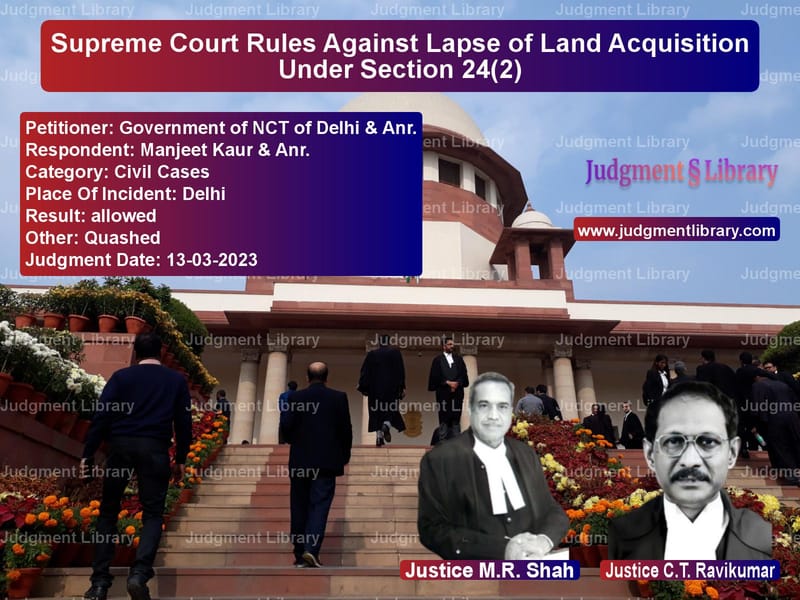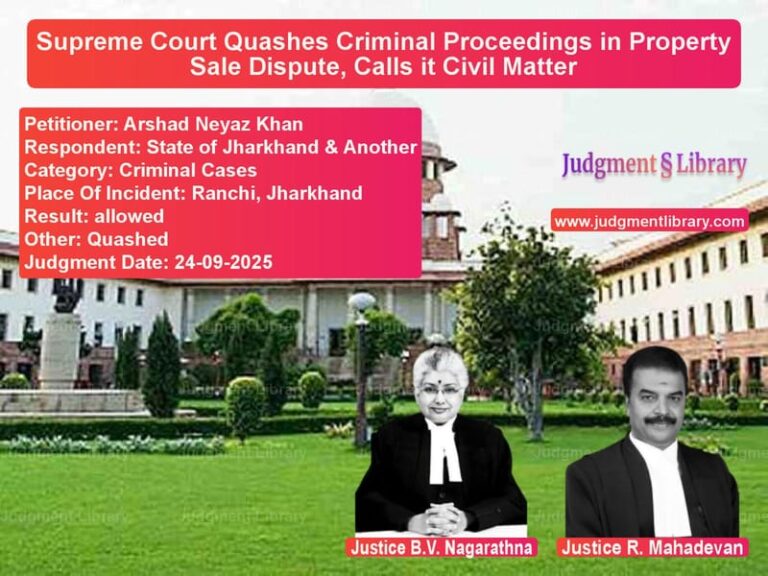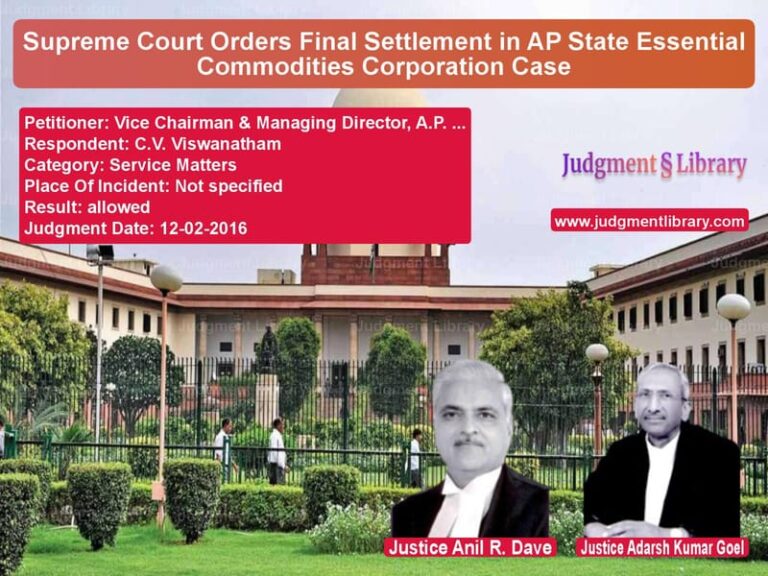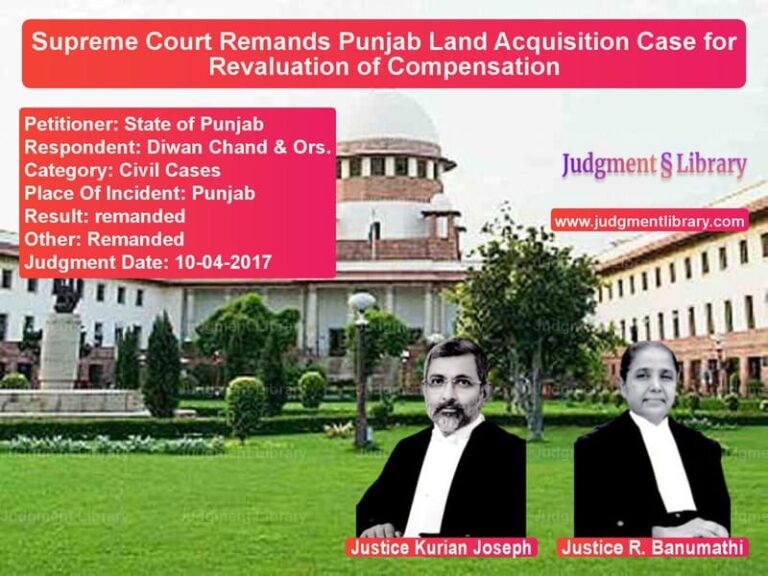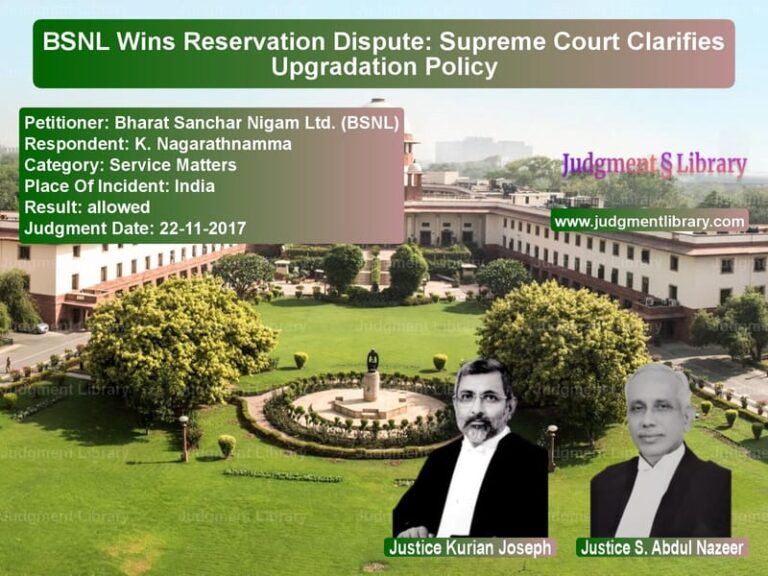Supreme Court Rules Against Lapse of Land Acquisition Under Section 24(2) of the 2013 Act
The Supreme Court of India has ruled in favor of the Land Acquisition Collector, holding that the land acquisition in question did not lapse under Section 24(2) of the Right to Fair Compensation and Transparency in Land Acquisition, Rehabilitation, and Resettlement Act, 2013 (hereinafter referred to as the ‘2013 Act’). The Court set aside the Delhi High Court’s judgment, which had declared the acquisition lapsed based on a now-overruled precedent.
Background of the Case
The dispute arose from the acquisition of land under the Land Acquisition Act, 1894 (‘1894 Act’). The award for the land in question was passed on June 19, 1992. The Land Acquisition Collector claimed that possession of the land was taken on April 21, 2006, and handed over to the Delhi Development Authority (DDA). However, the respondents challenged the acquisition under Section 24(2) of the 2013 Act, arguing that since compensation had not been paid, the acquisition should be deemed to have lapsed.
The Delhi High Court relied on the Supreme Court’s earlier judgment in Pune Municipal Corporation & Anr. v. Harakchand Misirimal Solanki & Ors. (2014) to rule in favor of the landowners and declared that the acquisition had lapsed. The Land Acquisition Collector and the DDA challenged this ruling before the Supreme Court.
Arguments by the Appellant (Land Acquisition Collector & Anr.)
- The High Court wrongly relied on the Pune Municipal Corporation case, which had been overruled by the Constitution Bench in Indore Development Authority v. Manoharlal & Ors. (2020).
- The Constitution Bench clarified that mere non-payment of compensation does not lead to the lapse of acquisition.
- Possession had already been taken and handed over to the DDA, fulfilling the legal requirements.
- The High Court failed to consider the binding precedent of the Constitution Bench in Indore Development Authority.
Arguments by the Respondents (Landowners)
- The landowners argued that they had not received compensation, and therefore, the acquisition should be deemed to have lapsed under Section 24(2) of the 2013 Act.
- The High Court had correctly followed the ruling in Pune Municipal Corporation, which was the prevailing law at the time.
- Since no compensation was paid, they had the right to claim lapsing of acquisition.
Supreme Court’s Observations and Ruling
The Supreme Court examined the Constitution Bench ruling in Indore Development Authority, which had overruled Pune Municipal Corporation. The Court reaffirmed the following principles:
- Section 24(2) of the 2013 Act provides for lapsing of acquisition only when both possession has not been taken and compensation has not been paid for five years prior to the commencement of the 2013 Act.
- If either possession has been taken or compensation has been paid, the acquisition remains valid.
- Payment of compensation includes tendering of compensation, even if the landowner refuses to accept it.
- Deposit of compensation in court or treasury is a valid discharge of the state’s obligation.
The Supreme Court held:
“Applying the law laid down in Indore Development Authority, there shall not be any deemed lapse under Section 24(2) of the 2013 Act. The High Court’s judgment is unsustainable and is accordingly quashed.”
Final Judgment
The Supreme Court allowed the appeal and ruled that:
- The acquisition of land does not lapse under Section 24(2) of the 2013 Act.
- The High Court’s ruling was erroneous as it relied on a precedent that had been overruled.
- The state and acquiring authority retain possession of the land, and compensation obligations must be fulfilled under existing legal provisions.
Implications of the Judgment
The ruling has significant implications for land acquisition law in India:
- Clarity on Land Acquisition: The judgment reinforces the correct interpretation of Section 24(2) of the 2013 Act and prevents misuse of lapsing provisions.
- Security for Public Projects: Ensures that large-scale infrastructure projects do not face unnecessary hurdles due to misinterpretation of acquisition laws.
- Limits on Judicial Overreach: Reaffirms that courts must follow the law as interpreted by the Constitution Bench and not rely on overruled precedents.
- Protection for Landowners: Confirms that landowners are entitled to compensation and legal remedies but cannot claim automatic lapsing of acquisition.
Conclusion
The Supreme Court’s ruling in Land Acquisition Collector v. B.S. Dhillon & Ors. provides much-needed clarity on the application of Section 24(2) of the 2013 Act. By reaffirming the Constitution Bench’s decision in Indore Development Authority, the Court has ensured consistency in land acquisition jurisprudence, preventing unnecessary disputes and protecting the interests of both landowners and development authorities.
Petitioner Name: Land Acquisition Collector and Another.Respondent Name: B.S. Dhillon & Others.Judgment By: Justice M.R. Shah, Justice C.T. Ravikumar.Place Of Incident: New Delhi.Judgment Date: 12-03-2023.
Don’t miss out on the full details! Download the complete judgment in PDF format below and gain valuable insights instantly!
Download Judgment: land-acquisition-col-vs-b.s.-dhillon-&-other-supreme-court-of-india-judgment-dated-12-03-2023.pdf
Directly Download Judgment: Directly download this Judgment
See all petitions in Property Disputes
See all petitions in Landlord-Tenant Disputes
See all petitions in Specific Performance
See all petitions in Judgment by Mukeshkumar Rasikbhai Shah
See all petitions in Judgment by C.T. Ravikumar
See all petitions in allowed
See all petitions in Quashed
See all petitions in supreme court of India judgments March 2023
See all petitions in 2023 judgments
See all posts in Civil Cases Category
See all allowed petitions in Civil Cases Category
See all Dismissed petitions in Civil Cases Category
See all partially allowed petitions in Civil Cases Category

